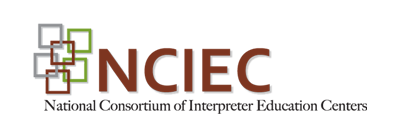Classroom Modules
The NIEC is pleased to share with the field of interpreter education infusion modules for the classroom. Our commitment is to develop and offer state-of-the-art curricular resources for undergraduate interpreter instruction. These modules are developed by knowledgeable subject matter experts and built upon National Consortium of Interpreter Education Centers effective practices. Each module includes readings, presentations, video, student activities and assessments, and instructor resources.
The aim is for each module to constitute 6-hours (and sometimes more) of instruction either delivered face-to-face or online. Further, instructors can identify activities that are undertaken within class structure or as self-directed learning. Each module is designed to allow an instructor to access the resources and download or cut and paste the content into their own institutional Learning Management System (LMS) such as Blackboard or Canvas.
In 2016, the modules were updated and moved into a more accessible format. They still are designed to be integrated with another LMS, but there now are new Student Resource pages that you can directly link to. Our hope is that these changes will make it even easier to use these excellent resources.
Below is a description of each module:
Social Justice in Interpreting: Designed for interpreter educators and mentors by Dr. Dave Coyne and Dr. Joseph Hill, this module provides content to introduce topics pertaining to social justice such as Allyship, Language Ideology and Attitudes, and Vlogs. Each unit includes written background, videos, and activities. View this module.
Deaf Interpreter/Hearing Interpreter Teams: Developed by an outstanding team at Gallaudet University Interpreting Services under the leadership of Carolyn Ressler, this module includes an Overview of DI/HI Teams, Assessing the Need for a DI/HI Team, Making a Case for a DI/HI Team, and the DI/HI Team at Work. Each section includes activities, readings, print and video lectures, and assessments. View this module.
DeafBlind Interpreting: This module builds on the the work found in Interpreting Strategies for Deaf-Blind Students: An interactive training tool for educational interpreters and The National Curriculum for Training Interpreters Working with People who are Deaf-Blind. Jane Hecker-Cain working with the Helen Keller National Center for Deaf-Blind Youth and Adults, LaGuardia Community College, and Deaf-Blind individuals has developed a thorough introduction to Deaf-Blind interpreting. The module includes information on such topics as interpreting modifications, environmental and ergonomic considerations, and additional responsibilities. Each unit includes written background, videos, activities and assessments. View this module.
Here’s to your Health: Infusing Healthcare into Interpreter Education Programs: This newly developed 6-10 hour customizable module on the topic of interpreting in healthcare settings for students is ready for use in your classroom. The module includes video testimonials from healthcare interpreters, role-play activities, and samples of two modules from the CATIE Center focused on the cardiovascular system and healthcare discourse. View this module.
VR 101-History, System & Process: This module provides an overview of the U.S. Vocational Rehabilitation System from its historic roots to the advent of modern-day disability rights legislation. Topics include: Interpreter perspectives of VR, the VR Act, the Rehabilitation Process, and Section 504, the Americans with Disabilities Act and other related legislation. The module includes video lectures, readings, activities and assessments. View this module.
Faces of Deaf Consumers: This module introduces students to the diverse group of VR Deaf consumers including discussions about language use and educational background. Students are introduced to a variety of Deaf consumers and develop a “situational assessment” based on Demand-Control Schema, as described by Pollard and Dean, to determine what appropriate resources are needed for a successful interpretation including whether to accept an assignment at all. The module includes video lectures, readings, activities and assessments. View this module.
